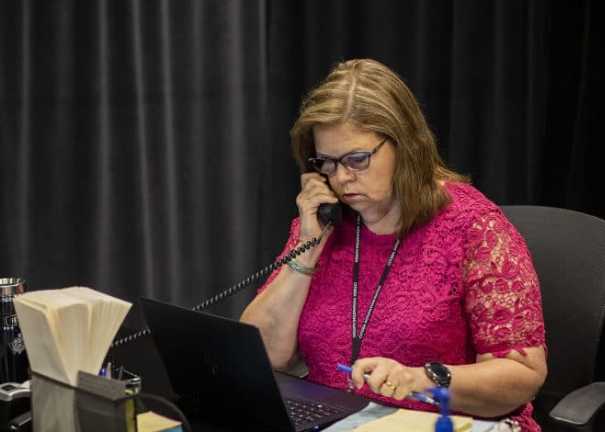
- Details
- By Chez Oxendine
SHAWNEE, Okla. — Unemployment has soared amid the spread of COVID-19, as businesses shut down and revenues dropped. Oklahoma stands at a 7.1 percent unemployment rate as of July 2020, more than double the 3.2 percent rate in February.
The unprecedented situation has prompted state and federal government responses like direct stimulus checks and extra benefits for those collecting unemployment insurance. Native American communities are stepping up, too, enacting programs to provide extra benefits for tribal members in dire straits.
The Citizen Potawatomi Nation’s Coronavirus Relief Fund is one example. Established in early June, the fund draws on resources allocated to the tribe by the CARES Act to assist its tribal citizens.
The fund provides up to $1,200 to those who can prove they have been furloughed or left unemployed and impacted negatively by COVID-19. Another program offers tribal member-owned businesses up to $5,000 to assist with business interruptions caused by mandatory closures, limited reopening procedures and decreased customer demand.
The assistance represents what the tribe called “Phase 1” of the Coronavirus Relief Fund in a news release.
The fund’s next phase focuses on students and elders. Programs include $300 per eligible dependent for school supplies, clothes, and personal protective equipment, or providing elders with a $200 grocery allowance through December.
In addition, eligible tribal members can request assistance for expenses such as rent, mortgage payments, utility bills, car payments, and insurance premiums.
In Phase 2 of the program, the tribe will be able to show that 65 percent of the money it received from the Treasury will go directly to Citizen Potawatomi member support programs, according to Tribal Chairman John “Rocky” Barrett. “We will keep responding to the needs of our Tribe for as long as we are able – until we run out of this money.”
The remaining 35 percent accounts for “job protection, technology, prevention, infrastructure and supplies,” Barrett said.
“This includes investment in medical and personal protective equipment, cleaning and disinfecting supplies and health care expenses associated with COVID-19. These funds will also cover the costs associated with reopening and stabilizing our enterprises,” Barrett said. “This includes paying for COVID-19 communications and training, protective physical barriers, information technology systems, infrastructure and equipment that includes remote work capabilities.”
CPN tribal members can find more information on assistance at undefined.
More Stories Like This
Native News Weekly (August 25, 2024): D.C. BriefsUS Presidents in Their Own Words Concerning American Indians
Native News Online Launches Year-End Campaign to Support ‘Warrior Journalism’
Native News Online’s Year-End Live Stream - Recap of 2025: A Night That Brings Indian Country Together
GivingTuesday: Groups Making a Real Impact in Indian Country
Help us tell the stories that could save Native languages and food traditions
At a critical moment for Indian Country, Native News Online is embarking on our most ambitious reporting project yet: "Cultivating Culture," a three-year investigation into two forces shaping Native community survival—food sovereignty and language revitalization.
The devastating impact of COVID-19 accelerated the loss of Native elders and with them, irreplaceable cultural knowledge. Yet across tribal communities, innovative leaders are fighting back, reclaiming traditional food systems and breathing new life into Native languages. These aren't just cultural preservation efforts—they're powerful pathways to community health, healing, and resilience.
Our dedicated reporting team will spend three years documenting these stories through on-the-ground reporting in 18 tribal communities, producing over 200 in-depth stories, 18 podcast episodes, and multimedia content that amplifies Indigenous voices. We'll show policymakers, funders, and allies how cultural restoration directly impacts physical and mental wellness while celebrating successful models of sovereignty and self-determination.
This isn't corporate media parachuting into Indian Country for a quick story. This is sustained, relationship-based journalism by Native reporters who understand these communities. It's "Warrior Journalism"—fearless reporting that serves the 5.5 million readers who depend on us for news that mainstream media often ignores.
We need your help right now. While we've secured partial funding, we're still $450,000 short of our three-year budget. Our immediate goal is $25,000 this month to keep this critical work moving forward—funding reporter salaries, travel to remote communities, photography, and the deep reporting these stories deserve.
Every dollar directly supports Indigenous journalists telling Indigenous stories. Whether it's $5 or $50, your contribution ensures these vital narratives of resilience, innovation, and hope don't disappear into silence.
 The stakes couldn't be higher. Native languages are being lost at an alarming rate. Food insecurity plagues many tribal communities. But solutions are emerging, and these stories need to be told.
The stakes couldn't be higher. Native languages are being lost at an alarming rate. Food insecurity plagues many tribal communities. But solutions are emerging, and these stories need to be told.
Support independent Native journalism. Fund the stories that matter.
Levi Rickert (Potawatomi), Editor & Publisher

